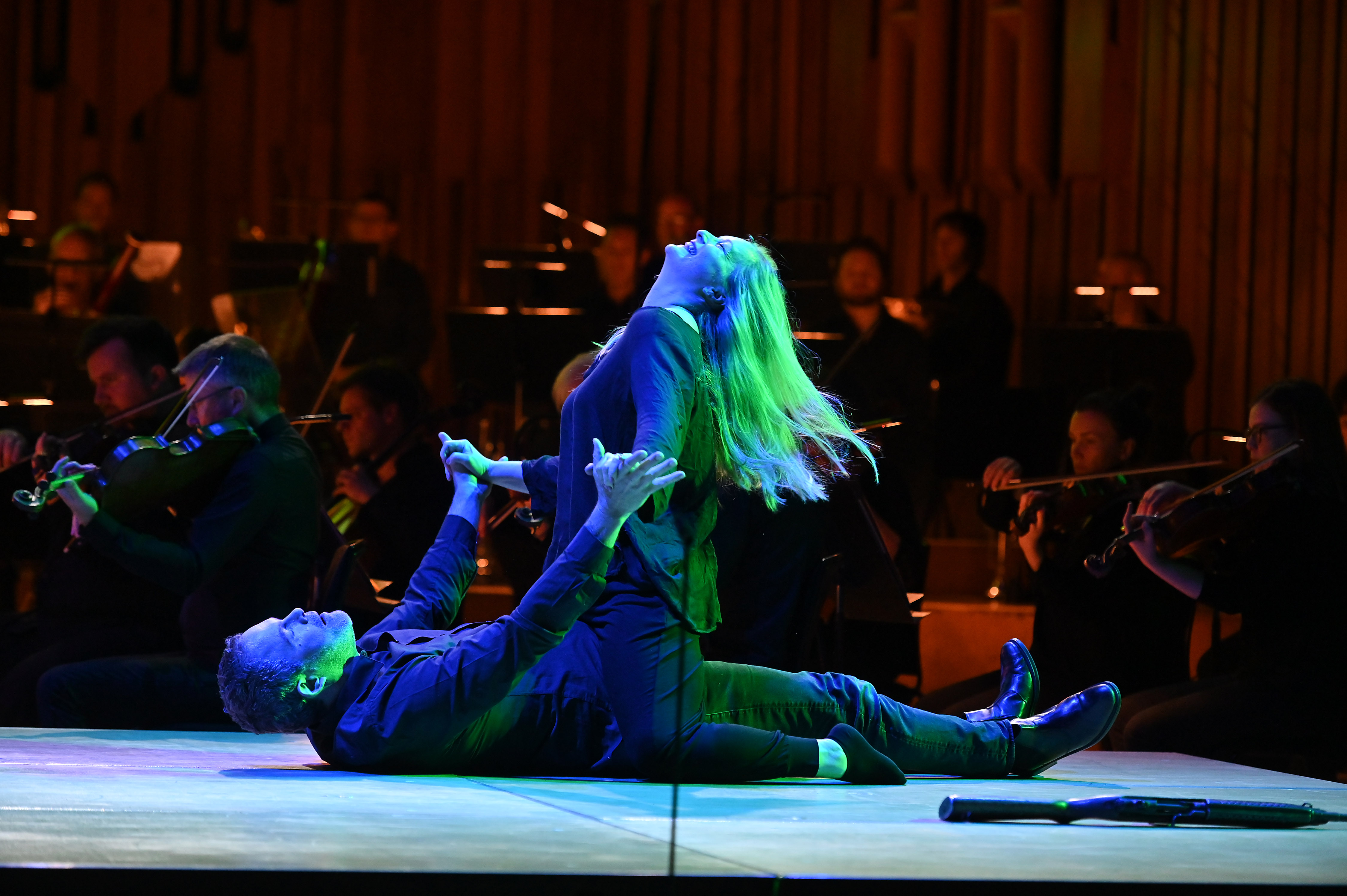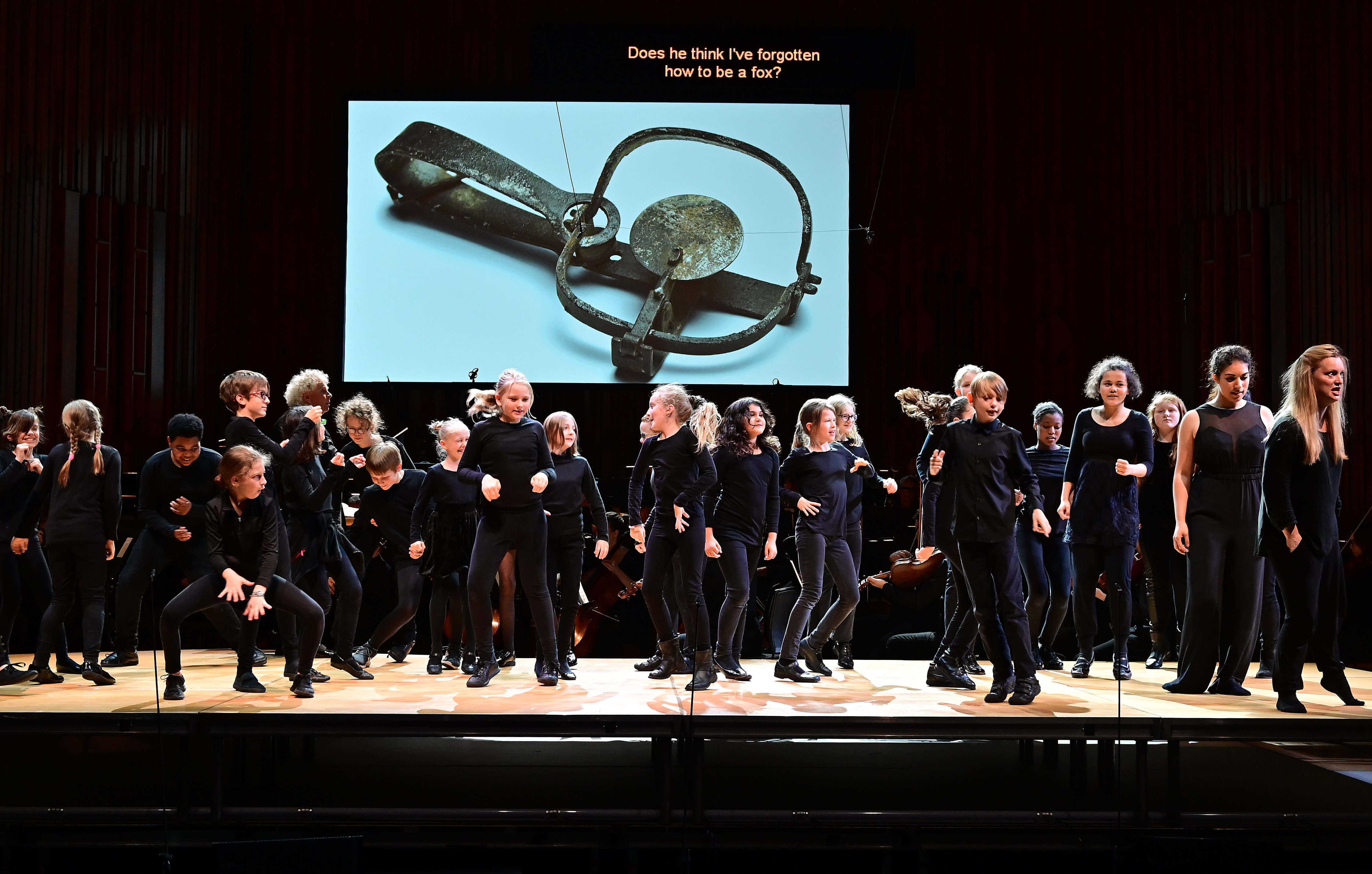The Cunning Little Vixen, Rattle, LSO, Barbican review – dark magic in the woods | reviews, news & interviews
The Cunning Little Vixen, Rattle, LSO, Barbican review – dark magic in the woods
The Cunning Little Vixen, Rattle, LSO, Barbican review – dark magic in the woods
Janáček's evergreen fable enchants and disturbs
As midsummer night’s dreams go, it would be hard to surpass the darkly enchanting collaboration between Sir Simon Rattle and Peter Sellars that will bring The Cunning Little Vixen to the Barbican again this evening and on Saturday. Janáček’s spellbinding vision of humans and animals caught up in the inexorable cycles of nature and time has its rough and scary side, of course.
Sellars’s semi-staged production (originally mounted in Berlin in late 2017) features some fairly brutal and even farcical action on the raised platform around which the London Symphony Orchestra plays. Meanwhile, the videos on a giant screen behind (designed by Nick Hillel and Adam Smith, jointly known as Yeast Culture) spare us few details of nature – and humankind – red in tooth and claw. As well as sun-dappled glades, looming giant moons and rushing torrents, we see horrific woodland traps, slaughtered hares and even close-ups of human souvlaki-munching to symbolise the survival-instinct urges that plant deathly rivalry within these magic woods.
Whether or not you agree with every one of Sellars’s choices as director (and he never quite loses the capacity to annoy as well as illuminate), the LSO with Rattle, on this form and on this terrain, brook no argument. Janáček’s music is of course a marvel from from first to last – earthy yet ethereal, folkloric but mystical, its visionary treetops firmly rooted in the Moravian soil. It received a wonderfully alert and agile reading from Rattle, who deeply loves and understands the work. This Vixen ran without a break, well-paced, studded with dramatic twists, and swift-flowing as the filmed streams and waterfalls that intermittently reminded us of the onrush of change that denies permanence or security to the life of any mortal thing. Both lush and lithe, as the scenes demanded, the LSO commanded both the ecstatic rapture of the orchestral interludes – as moon and sun rose and set over the vixen’s lovely, fatal forest – and the almost cabaret-like wit and flair of the writing that partners the drama. From David Elton’s cheeky trumpet and Gareth Davies’s rhapsodic flute to the uncanny muted brass and the spine-tingling string shimmer that guest leader Tomo Keller drew from his crew, Rattle and his forces could on their own transport us into the trackless heart of the woodlands where Janáček’s creatures live, love and die. 
As Ms Sharp-Ears herself, Lucy Crowe (pictured above with Gerald Finley) prowled, flounced, leapt and slunk with a feisty repertoire of bad attitudes that made a delicious contrast with the refined, silvery sheen and swoop of her soprano. It’s eat or be eaten in this wood, and I especially loved her cynical recruitment of the gormless chickens into an animal-rights campaign as a prelude to – you know what. Her moments of solitary yearning had an eerie glamour and mystery, while the entrancing love duet with Sophia Burgos’s full-toned and finely-sung soprano Fox captured both the snarling and the sensuous sides of their liaison. As prisoner of Gerald Finley’s droll but moving Forester, Crowe joined smouldering ferocity with an erotic fizz and crackle. The pair wrestled and they nestled, in keeping with the physicality of a production that imagined all these creatures bound tightly together by bonds of need, desire and curiosity that, for better or worse, will override their fears of being devoured.
Doubling human and animal roles, Paulina Malefane’s Forester’s Wife (and Owl), and Anna Lapkovskaja’s Mrs Pasek (and Dog), offered robust support. As the poacher Haraschta, the superb bass-baritone Hanno Müller-Brachmann made the most of his peach of a part, especially as he roamed through the audience while singing of his Gypsy love Terynka. Peter Hoare made a suitably absurd but sympathetic Schoolmaster, yearning for the love that surrounds him in nature but that he, that bookish “old broomstick in the corner”, has never tasted.
The London Symphony Chorus under Simon Halsey both sang gorgeously, and niftily managed the manoeuvres that their arrivals and departures demanded. As the younger animals, the children’s chorus of the LSO Discovery Voices (pictured below as the fox cubs) absolutely stole their scenes, with impeccable solo turns from Saoirse Exelby and Theo Smith. The mass disco that accompanied Vixen and Fox’s wedding was a joyous wonder to behold.

The future of Arts Journalism
You can stop theartsdesk.com closing!
We urgently need financing to survive. Our fundraising drive has thus far raised £49,000 but we need to reach £100,000 or we will be forced to close. Please contribute here: https://gofund.me/c3f6033d
And if you can forward this information to anyone who might assist, we’d be grateful.

Subscribe to theartsdesk.com
Thank you for continuing to read our work on theartsdesk.com. For unlimited access to every article in its entirety, including our archive of more than 15,000 pieces, we're asking for £5 per month or £40 per year. We feel it's a very good deal, and hope you do too.
To take a subscription now simply click here.
And if you're looking for that extra gift for a friend or family member, why not treat them to a theartsdesk.com gift subscription?
more Opera
 La bohème, Opera North review - still young at 32
Love and separation, ecstasy and heartbreak, in masterfully updated Puccini
La bohème, Opera North review - still young at 32
Love and separation, ecstasy and heartbreak, in masterfully updated Puccini
 Albert Herring, English National Opera review - a great comedy with depths fully realised
Britten’s delight was never made for the Coliseum, but it works on its first outing there
Albert Herring, English National Opera review - a great comedy with depths fully realised
Britten’s delight was never made for the Coliseum, but it works on its first outing there
 Carmen, English National Opera review - not quite dangerous
Hopes for Niamh O’Sullivan only partly fulfilled, though much good singing throughout
Carmen, English National Opera review - not quite dangerous
Hopes for Niamh O’Sullivan only partly fulfilled, though much good singing throughout
 Giustino, Linbury Theatre review - a stylish account of a slight opera
Gods, mortals and monsters do battle in Handel's charming drama
Giustino, Linbury Theatre review - a stylish account of a slight opera
Gods, mortals and monsters do battle in Handel's charming drama
 Susanna, Opera North review - hybrid staging of a Handel oratorio
Dance and signing complement outstanding singing in a story of virtue rewarded
Susanna, Opera North review - hybrid staging of a Handel oratorio
Dance and signing complement outstanding singing in a story of virtue rewarded
 Ariodante, Opéra Garnier, Paris review - a blast of Baroque beauty
A near-perfect night at the opera
Ariodante, Opéra Garnier, Paris review - a blast of Baroque beauty
A near-perfect night at the opera
 Cinderella/La Cenerentola, English National Opera review - the truth behind the tinsel
Appealing performances cut through hyperactive stagecraft
Cinderella/La Cenerentola, English National Opera review - the truth behind the tinsel
Appealing performances cut through hyperactive stagecraft
 Tosca, Royal Opera review - Ailyn Pérez steps in as the most vivid of divas
Jakub Hrůša’s multicoloured Puccini last night found a soprano to match
Tosca, Royal Opera review - Ailyn Pérez steps in as the most vivid of divas
Jakub Hrůša’s multicoloured Puccini last night found a soprano to match
 Tosca, Welsh National Opera review - a great company reduced to brilliance
The old warhorse made special by the basics
Tosca, Welsh National Opera review - a great company reduced to brilliance
The old warhorse made special by the basics
 BBC Proms: The Marriage of Figaro, Glyndebourne Festival review - merriment and menace
Strong Proms transfer for a robust and affecting show
BBC Proms: The Marriage of Figaro, Glyndebourne Festival review - merriment and menace
Strong Proms transfer for a robust and affecting show
 BBC Proms: Suor Angelica, LSO, Pappano review - earthly passion, heavenly grief
A Sister to remember blesses Puccini's convent tragedy
BBC Proms: Suor Angelica, LSO, Pappano review - earthly passion, heavenly grief
A Sister to remember blesses Puccini's convent tragedy
 Orpheus and Eurydice, Opera Queensland/SCO, Edinburgh International Festival 2025 review - dazzling, but distracting
Eye-popping acrobatics don’t always assist in Gluck’s quest for operatic truth
Orpheus and Eurydice, Opera Queensland/SCO, Edinburgh International Festival 2025 review - dazzling, but distracting
Eye-popping acrobatics don’t always assist in Gluck’s quest for operatic truth

Add comment